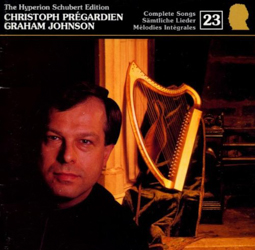Franz Schubert Lieder von 1816

Hyperion
Erscheinungsdatum 1995
Spieldauer 78' 08''
Komponist: Franz Schubert (1797 - 1828)
Christoph Prégardien, Tenor
Graham Johnson, Klavier
Aufnahme: September 1994
Katalognummer: DJ 33023, 1 CD
The Hyperion Schubert Edition, Complete Songs Vol. 23
CANNES CLASSICAL AWARD 1995
Inhalt
01. Der Tod Oskars D 375
02. Das Grab D 377
03. Der Entfernten D 350
04. Pflügerlied D 392
05. Abschied von der Harfe D 406
06. Der Jüngling an der Quelle D 300
07. Abendlied D 382
08. Stimme der Liebe (D 412
09. Romanze D 144
10. Geist der Liebe D 414
11. Klage D 415
12. Julius an Theone D 419
13. Der Leidende D 432
14. Der Leidende D 432b
15. Die frühe Liebe D 430
16. Die Knabenzeit D 400
17. Edone D 445
18. Die Liebesgötter D 446
19. An Chloen D 363
20. Freude der Kinderjahre D 455
Gesänge des Harfners aus Wilhelm Meister D 478 - 480
21. Wer sich der Einsamkeit ergibt
22. Wer nie sein Brot mit Tränen aß
23. An die Türen will ich schleichen
24. Der Hirt D 490
25. Am ersten Maimorgen D 344
26. Bei dem Grabe meines Vaters D 496
27. Mailied D 503
28. Zufriedenheit D 362
29. Skolie D 507
Online bestellen bei 

Gramophone, July 1995
When the Hyperion Schubert Edition is finally completed, I am certain that this latest wondrous offering, singer and pianist perfectly suited to the music in hand, will rank among its most precious jewels. Pregardien is a prince among tenor interpreters of Lieder at present, on a par with Blochwitz in instinctive, natural and inevitably phrased readings. Johnson, besides of course finding exactly the right horse for this chosen course, surpasses even his own high standard of playing in this series. Then there is Schubert himself, the Schubert of 1816 by and large, as Johnson tentatively suggests in his notes, going through a phase of "bringing himself under control". That means, largely but far from entirely, writing gently lyrical strophic songs, most of them of ineffable beauty and simplicity, starkly contrasting with the Harfenspieler settings from Wilhelm Meister, two written in 1816, the other in 1822.
The CD begins with perhaps the least inviting piece, the ballad, Der Tod Oscars, typical of Schubert in his miniature-opera vein. The pair perform it with conviction, but seem, very properly, happier in the shorter songs that follow. In such an outright masterpiece as Der Jungling an der Quelle, Pregardien and Johnson confirm the latter's view that this piece "makes time stand still". They emphasize, in Stimme der Liebe, how Schubert uses shifting harmonies to indicate romantic obsession. They show in the two similar but subtly different versions of Der Leidende ("The suffering one") what Johnson calls "two sides of the same coin", with the tenor's plangent, tender singing, line and text held in perfect balance, an unalloyed delight.
The two Holty songs that follow, Die fruhe Liebe and Die Knabenzeit, evince a wonderful affinity with thoughts of childhood on the part of poet and composer, again ideally captured here. So is the "chaste and wistful" mood of Klopstock's Edone. These are just a few in a basket of discoveries on a disc lasting a generous 78 minutes.
Johnson has serious reservations that I don't share about the Matthisson setting, Klage, where I find the numbed feeling of the second part of each stanza starkly moving, and I like more than he the operatic gestures of Julius an Theone, another Matthisson poem.
The undoubted greatness found in the settings of the Harper's utterances is adumbrated in rewarding detail by Johnson in his writing – and then performed by the pair with a depth of understanding and innate musicality that brooks no criticism and demands, immediately, a second hearing. The one artist seems to spur on the other in piercing to the soul of these intense and eloquent pieces.
Even then the wonders of this disc aren't at an end. Bei dem Grabe meines Vaters, a companion piece to the better-known Claudius setting, Am Grabe Anselmos, is paradoxically Mozartian and echt Schubert in mood and music and the equivocal feeling of Der Hirt, a neglected Mayrhofer setting, shouldn't be overlooked, nor indeed the joyful mood of the rediscovered Mailied, a Holty setting, that lifts the spirits in the manner of Seligkeit.
We are lucky, indeed privileged, to have Pregardien and Johnson as such convincing interpreters; not forgetting Hyperion for providing an ideally balanced recording, nor RW whose translations have been a consistent source of pleasure throughout the Edition.